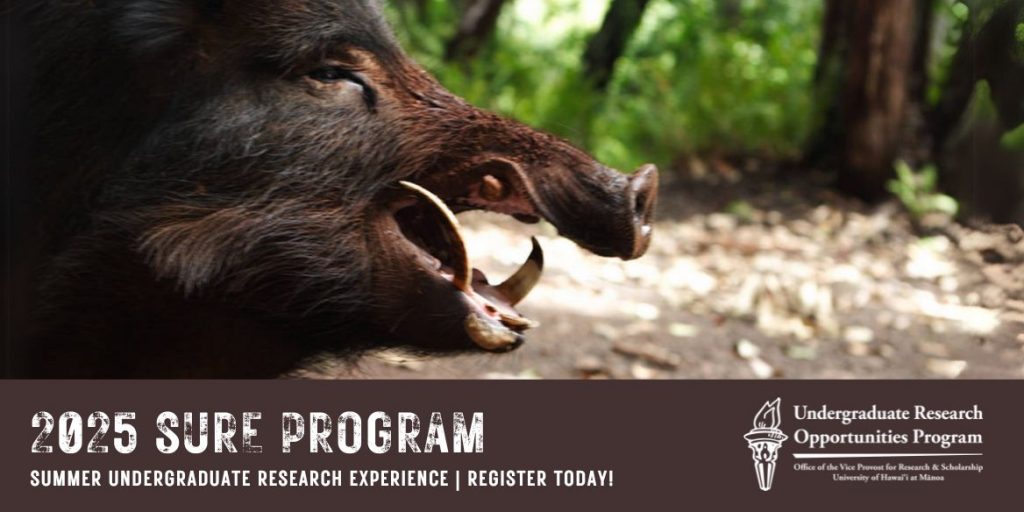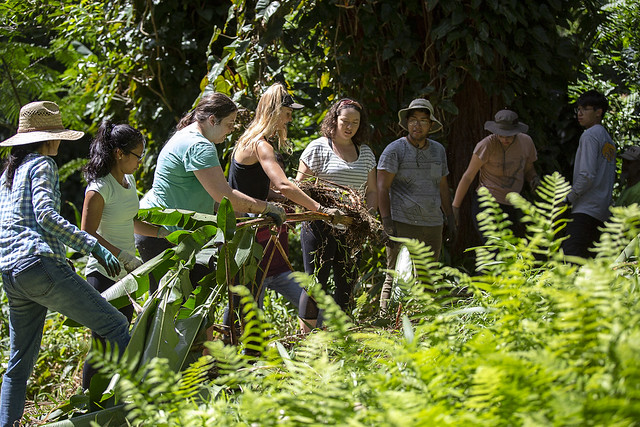Overview

The Summer Undergraduate Research Experience (SURE) is a free nine-week program that provides supplementary infrastructure to undergraduate students at the University of Hawai‘i at Mānoa (UHM) during the summer.
SURE provides participants with a cohort of undergraduate peers; nine weeks of programming, including professional development modules and a presentation venue; and the Mentoring Grant to support eligible student projects.
Note that SURE does not provide undergraduate students with research/creative work projects, positions, or mentors.
Click here to view this year’s program flyer!
About the Promo Image
Cohort of Undergraduate Peers

SURE provides students with a supportive cohort of peers. Most students conducting research and creative work at UHM in the summer may be working independently or in small groups, and therefore may feel isolated in their respective work spaces. Students in this situation are not benefiting from the cohort structure that other organized summer research programs offer (e.g., NSF-REU site programs). The SURE program serves as a central gathering place where students can meet each other and reflect on the challenges, solutions, and rewards they experience when working on their projects.
Programming
SURE offers professional development modules for students to build additional professional and academic skills outside of their research and creative work projects. There are no attendance requirements for registered students; i.e., after signing up, registrants are free to attend as many or as few sessions as they desire.
Please see below for a full listing of this year’s offerings.
The SURE Symposium provides an end-of-summer venue for undergraduate students to present their research and creative work. The event is free and open to students in all disciplines. The 2025 Symposium will take place on Friday, August 1 at the Hawai’i Imin International Conference Center. Learn more on the SURE Symposium webpage.
Title | Module Leader(s) | Date | Description |
|---|---|---|---|
Campus Plant Tour and Service Learning Opportunity | Nōweo Kai, UH Mānoa Campus Arboretum Curator | Wednesday, June 4 at 11:30 AM | This cohort-building module combines a tour of the UH Mānoa campus with a hands-on service opportunity for students to get acquainted with both the university and each other. |
Kickstarting and Managing Research/Creative Work | UROP Staff | Thursday, June 5 at 11:30 AM | UROP staff discuss ways students can start conducting research or creative work off on the right foot. This module covers topics such as reasons to do research or creative work, how to manage a project, how to work with a mentor, best practices for effective time management, and more. |
EndNote Online | Patricia Brandes and Carolyn Dennison, Hamilton Library Science and Technology Reference Librarians | Thursday, June 12 at 11:30 AM | This workshop introduces EndNote Online, a free, easy-to-use tool for collecting, organizing, and citing your research sources. Topics covered will include adding references and PDFs to your EndNote Online library; organizing and managing references using groups; creating Notes; and inserting citations and creating a bibliography in Microsoft Word. |
Responsible Conduct of Research: Importance and Case Studies | UROP Staff | Thursday, June 19 at 11:30 AM | Attendees will be introduced to responsible conduct of research (RCR) as a standard practice for researchers and creative workers. The first part of this module covers the conceptual and practical aspects of RCR and underscores its importance to properly conducting research and creative work in all disciplines. The second part reviews case studies to illustrate the consequences of misconduct in research and creative work. |
Identifying and Exploring Graduate Schools | Creighton Litton, UH Mānoa Professor of Natural Resources and Environmental Management; Barbara VanBenthuysen, UH Mānoa M.A. Candidate in Anthropology; Mitchell Marabella, UH Mānoa M.S. Candidate in Molecular Bioscience and Bioengineering | Thursday, June 26 at 11:30 AM | UROP staff facilitate a panel discussion of basic considerations when thinking about graduate school, including the benefits and tradeoffs of entering a grad program, different program types and possible career paths, finding an advisor, and more. Guest speakers from different disciplines each provide their unique perspectives and experiences on topics like why they chose their respective schools and programs, what their experience was like applying for and after finishing graduate school, what makes for successful applications, and more. |
Résumé and Cover Letter Writing | JP Bingham, UH Mānoa Assistant Professor of Molecular Bioscience and Bioengineering | Thursday, July 3 at 11:30 AM | Real-world professionals discuss ways to build and organize the content of impactful résumés and cover letters. Students will learn how to describe responsibilities and accomplishments, both academic and professional, as well as receive advice about formatting and presentation. The discussion will cater to students at all stages in their professional journeys, whether first-time job seekers or experienced employees. |
Best Practices for Oral and Poster Presentations | UROP Staff | Thursday, July 17 at 11:30 AM | UROP and Honors Program staff members will introduce students to two different formats for professional presentations: oral and poster. The discussion will cover how to design and format slides and posters, best practices for speaking to the audience, and what to expect during a Q&A session. Students will learn how to effectively create their first professional presentation and how to refine existing presentations. |
Mentoring Grant
The Mentoring Grant provides awards of up to $10,000 each to eligible mentors of undergraduate students conducting research or creative work during the summer. Funds are disbursed to mentors and must be used to directly support undergraduate student projects.
Submissions from all disciplines are accepted, with particular interest given to applications from non-STEM fields and from early-career mentors in any discipline.
Note that the Mentoring Grant has specific eligibility requirements independent of SURE eligibility requirements. Learn more on the “Eligibility tab” of the Mentoring Grant page.
Students participating in summertime research and creative work through the Mentoring Grant are encouraged to participate in the SURE professional development modules and are required to present their work either at the SURE Symposium or the Fall Undergraduate Showcase.
Participation and Eligibility Guidelines
Student Eligibility
Students eligible to participate in the SURE program include:
- All UHM undergraduate students with little to no mentored research and creative work experience or are already participating in mentored research and creative work
- Any non-UHM undergraduate student doing research or creative work with a UHM mentor
Students do NOT need to be funded by UROP’s ERC, Project, Presentation, or Mentoring Grant funding opportunities to participate.
Mentor Eligibility
Mentors whose students are eligible to participate in SURE include:
- Any UHM mentor of a UHM or non-UHM undergraduate student conducting research or creative work during the summer is encouraged to have the student participate in the SURE program
- Any non-UHM professionals (e.g. postdoctoral researcher at National Oceanic and Atmospheric Administration [NOAA]) mentoring a UHM undergraduate student is also encouraged to have the student join the SURE program.
Mentors whose students are applying to UROP’s ERC, Project, or Presentation funding, or who are themselves applying for a Mentoring Grant, must meet certain eligibility criteria. See each page for additional information.
Participation is not mandatory. Students may choose which modules to attend. Students are encouraged to attend the end-of-summer Symposium, at a minimum.
